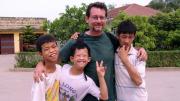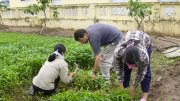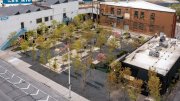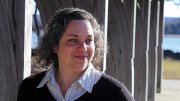Expelled from Harvard in 1969 for participating in the University Hall takeover, John Berlow ’71 traveled the world, living in Israel, Canada, and West Africa. But he did not go to Vietnam until 2000. “In ’69 I was an angry young man,” he says. “I am not very young or very angry now, but I still feel impassioned, and Vietnam has become my home. It was important to me then and still is.”
In 2002, he began teaching English at the Vietnam Friendship Village, near Hanoi, which houses military veterans and young people with mental deficiencies caused by Agent Orange, the herbicide used by the U.S. army in the Vietnam War. There he was struck by the lack of easy access to fruits and vegetables free of pesticide residue, and saw a need for environmentally sensitive development in the area.
He also met Vuong Ngoc Quang, one of the few local farmers who spoke English, who helped him learn Vietnamese. Berlow was impressed by Quang’s agricultural expertise and shared his ideas for healthier crops. Together they started the Organic Gardening Project in 2005 to plant gardens and orchards that would provide uncontaminated produce for residents and staff at the Friendship Village. Their efforts attracted support from volunteers and donors as well as media attention: a Hanoi TV special on the project dubbed Berlow “Mr. Clean Vegetables John.”
This initial success encouraged Berlow, who had an agro-forestry plan of larger scope in mind. Through the Green Vietnam Project, he aims to promote peace, reduce poverty, and protect and improve the environment, in part by planting three million trees to commemorate the Vietnamese who died in the war. The project, he believes, “can address this continuing pain I feel about the war, and that others feel and should feel, and the concern--and concern is too weak a word--for the environmental catastrophes that loom.”
In Tuyen Quang Province, where the slash-and-burn practices of local cassava farmers have depleted both soil and water, Berlow and Quang have created a model fruit farm that is better for the environment and more profitable as well. Their goal is to provide a few hundred trees for each interested farming community to start with, but even then, it will take three to four years for the trees to start bearing. Berlow had received donations from individuals, including classmates, and from the Canada Fund, but he knew he would need more financial support.
Happily, one of his freshman roommates managed the class of ’71’s independent listserv; this reconnection with Harvard prompted the suggestion that the Green Vietnam Project become a class-gift alternative (https://hr71.wikidot.com/green-vietnam). Helped by several classmates who are now co-directors of the project, Berlow is turning his vision into an official nonprofit organization.
Working in Vietnam much of the year, he is also realizing his dream of doing something closer to nature. “My grandma told me about growing up in a village in Ukraine and living under a thatched roof,” he says. “Now in Vietnam I live under a thatched roof...There’s a sense of rightness.”










